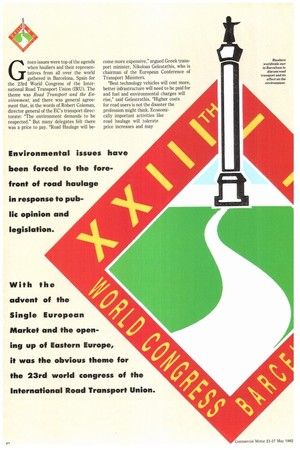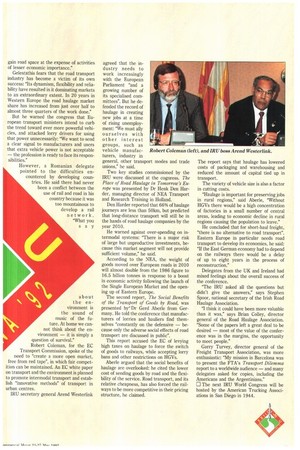G reen issues were top of the agenda when hauliers and
Page 44

Page 45

If you've noticed an error in this article please click here to report it so we can fix it.
their representatives from all over the world gathered in Barcelona, Spain for the 23rd World Congress of the International Road Transport Union (IRU). The theme was Road Transport and the Environment, and there was general agreement that, in the words of Robert Coleman, director general of the EC's transport directorate: "The environment demands to be respected." But many delegates felt there was a price to pay. "Road Haulage will be
come more expensive," argued Greek transport minister, Nikoloas Gelestathis, who is chairman of the European Conference of Transport Ministers.
"Best technology vehicles will cost more, better infrastructure will need to be paid for and fuel and environmental charges will rise," said Gelestrathis. "Higher costs for road users is not the disaster the profession might think. Economically important activities like road haulage will tolerate price increases and may gain road space at the expense of activities of lesser economic importance."
Gelestathis fears that the road transport industry has become a victim of its own success: "Its dynamism, flexibility and reliability have resulted in it dominating markets to an extraordinary extent. In 20 years in Western Europe the road haulage market share has increased from just over half to almost three quarters of the work done."
But he warned the congress that European transport ministers intend to curb the trend toward ever more powerful vehicles, and attacked lorry drivers for using that power unnecessarily: "We want to send a clear signal to manufacturers and users that extra vehicle power is not acceptable — the profession is ready to face its responsibilities."
However, a Romanian delegate pointed to the difficulties encountered by developing countries. He said there had never been a conflict between the use of rail and road in his country because it was too mountainous to develop a rail network. "What you say about the environment is the sound of music of the future. At home we cannot think about the environment — it is simply a question of survival."
Robert Coleman, for the EC Transport Commission, spoke of the need to "create a more open market, free from red tape", in which fair competition can be maintained. An EC white paper on transport and the environment is planned to promote intermodal transport and establish "innovative methods" of transport in urban centres.
IRU secretary general Arend Westerlink agreed that the industry needs to work increasingly with the European Parliament "and a growing number of its specialised committees". But he defended the record of haulage in creating new jobs at a time of rising unemployment: "We must ally ourselves with other interest groups, such as vehicle manufacturers, industry in general, other transport modes and trade unions," he said.
Two key studies commissioned by the IRU were discussed at the cognress. The Place of Road Haulage in Tomorrow's Europe was presented by Dr Henk Den Harder, managing director of NEA Transport and Research Training in Holland.
Den Harder reported that 66% of haulage journeys are less than 50km, but predicted that long-distance transport will still be in the hands of road haulage companies by the year 2010.
He warned against over-spending on intermodal systems: "There is a major risk of large but unproductive investments, because this market segment will not provide sufficient volume," he said.
According to the NEA, the weight of goods moved over European roads in 2010 will almost double from the 1986 figure to 16.5 billion tonnes in response to a boost in economic activity following the launch of the Single European Market and the opening up of Eastern Europe.
The second report, The Social Benefits of the Transport of Goods by Road, was presented by' Dr Gerd Aberle from Germany. He told the conference that manufacturers of lorries and hauliers find themselves "constantly on the defensive — because only the adverse social effects of road transport are discussed in public".
This report accused the EC of levying high taxes on haulage to force the switch of goods to railways, while accepting lorry bans and other restrictions on I-IGVs.
Aberle argued that the social benefits of haulage are overlooked: he cited the lower cost of sending goods by road and the flexibility of the service. Road transport, and its relative cheapness, has also forced the railways to be more competitive in their pricing structure, he claimed. The report says that haulage has lowered costs of packaging and warehousing and reduced the amount of capital tied up in transport.
The variety of vehicle size is also a factor in cutting costs.
"Haulage is important for preserving jobs in rural regions," said Aberle, "Without HGVs there would be a high concentration of factories in a small number of central areas, leading to economic decline in rural regions causing the population to leave."
He concluded that for short-haul freight, "there is no alternative to road transport". Eastern Europe in particular needs road transport to develop its economies, he said: "If the East German economy had to depend on the railways there would be a delay of up to eight years in the process of reconstruction."
Delegates from the UK and Ireland had mixed feelings about the overall success of the conference.
"The IRU asked all the questions but didn't give the answers," says Stephen Spoor, national secretary of the Irish Road Haulage Association.
"I think it could have been more valuable than it was," says Brian Colley, director general of the Road Haulage Association. "Some of the papers left a great deal to be desired — most of the value of the conference was in the margins, the opportunity to meet people."
Garry Turvey, director general of the Freight Transport Association, was more enthusiastic: "My mission in Barcelona was to present the FTA's Transport Dilemma report to a worldwide audience — and many delegates asked for copies, including the Americans and the Argentinians."
0 The next IRU World Congress will be hosted by the American Trucking Associations in San Diego in 1944.




























































































